MAY 2023
SPECIAL ISSUE
Holistic Prevention and Treatment of Long Covid

Pregnancy and Post-Covid Fatigue
L-Arginine, Exercise Capacity, and Energy in Long Covid
Quercetin in Early-Stage Covid
Postviral Health SUPPLEMENT
ATTEND the 2024 Integrative Healthcare Symposium next February 15-17 in New York City.
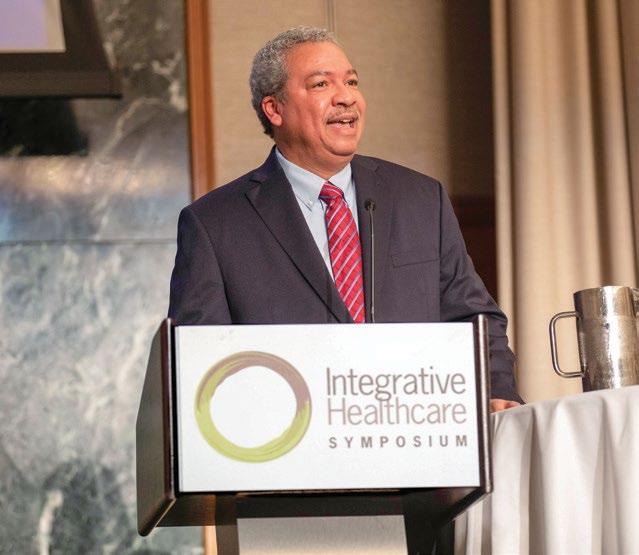
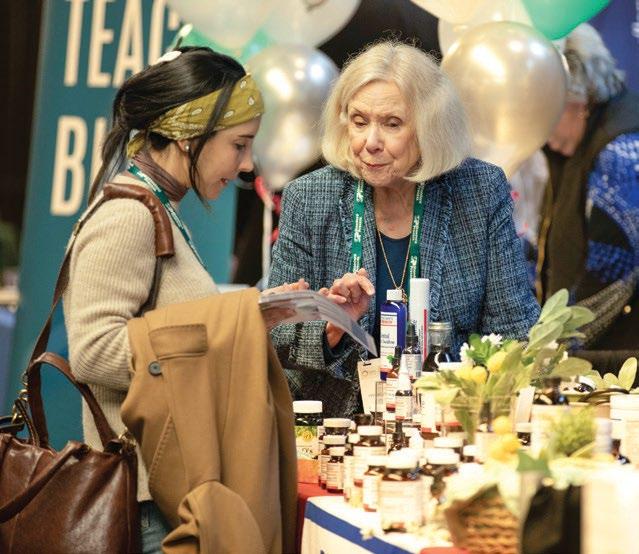



Follow us for event and industry news: #IHSNY24 PORTFOLIO OF INTEGRATIVE HEALTHCARE MEDIA + EVENTS Where education, inspiration + connections A D VA N C E
SAVE THE DATE FOR #IHSNY24
At the Integrative Healthcare Symposium, practitioners from all facets of traditional and non-traditional medicine come together to learn, connect, and enhance patients’ lives. Produced by Learn more about the 2024 event at: ihsymposium.com Innovate Network Engage SEND ME UPDATES ABOUT #IHSNY24




http://eepurl.com/d6zXb WANT TO GET NATURAL MEDICINE JOURNAL IN YOUR INBOX EACH MONTH? SUBSCRIBE FOR FREE! SPECIAL ISSUE POSTVIRAL HEALTH MAY 2023 VOL. 16, NO. 51 (SUPPL) Contents Copyright © 2021 by the Natural Medicine Journal All rights reserved. 4 Contributors 5 A Message from the Publisher ABSTRACTS & COMMENTARY 6 L-Arginine and Vitamin C Reduced Long-Covid Symptoms in 1 Month 8 Pregnancy & Post-Covid Fatigue 12 Quercetin in Early Covid EXPERT INTERVIEW 14 Long Covid Prevention and Recovery
Contributors
LISE ALSCHULER, ND, FABNO, is a professor of clinical medicine at the University of Arizona where she is the associate director of the Fellowship in Integrative Medicine at the Andrew Weil Center for Integrative Medicine. Alschuler obtained her naturopathic medical degree from Bastyr University where she completed her residency in general naturopathic medicine. She received her bachelor of science degree from Brown University. She is board-certified in naturopathic oncology. Alschuler is past-president of the American Association of Naturopathic Physicians and a founding board member, immediate past-president and current board member of the Oncology Association of Naturopathic Physicians. She is coauthor of Definitive Guide to Cancer, now in its 3rd edition, and Definitive Guide to Thriving After Cancer
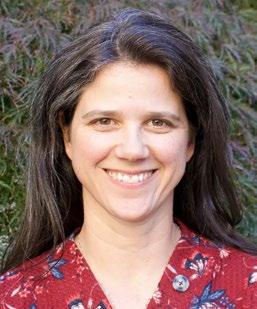

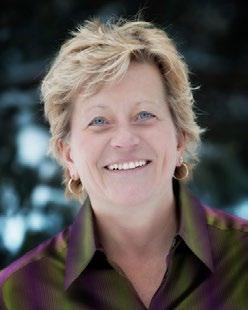
KAYCIE ROSEN GRIGEL, ND, is the owner of the Golden Naturopathic Clinic, LLC, and Thriving Survivors, which helps breast cancer patients and survivors heal from cancer treatment. Grigel graduated magna com laude from the University of Colorado Boulder, and received her doctorate of naturopathic medicine from Bastyr University. She practiced in Anchorage, Alaska, before returning to her home state of Colorado. She has been in practice since 2003 and loves to balance her work with playing in the mountains with her family.
TINA KACZOR, ND, FABNO, is editor in-chief of Natural Medicine Journal and the creator of Round Table Cancer Care. Kaczor is a naturopathic physician board certified in naturopathic oncology. She received her naturopathic doctorate from the National University of Natural Medicine and completed her residency at Cancer Treatment Centers of America. She is also the editor of the Textbook of Naturopathic Oncology and cofounder of The Cancer Pod, a podcast for cancer patients, survivors, caregivers, and everyone in between.

CAITLIN O’CONNOR, ND, provides naturopathic care with a focus on women’s and children’s health. She pairs a philosophy of patientcentered, whole-body, individualized care with an emphasis on nutrition, botanical medicine, and a balanced approach to healthy living. She practices in Denver, Colorado, where she has been active in the political process of regulating naturopathic doctors. O’Connor graduated from Bastyr University in 2008 with a doctorate of naturopathic medicine and a certificate in naturopathic midwifery. In addition to teaching at the Nutrition Therapy Institute, she has presented for both lay and professional audiences including the American Association of Naturopathic Physicians, Colorado Midwives Association, the Colorado Association of Naturopathic Doctors, and the Pediatric Association of Naturopathic Physicians.
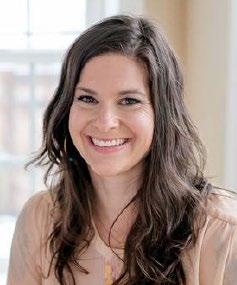
4 ©2023 NATURAL MEDICINE JOURNAL. ALL RIGHTS RESERVED. NMJ, MAY 2023 SUPPLEMENT—VOL. 16, NO. 51 (SUPPL)
Copyright © 2023 by the Natural Medicine Journal All rights reserved.
Tina Kaczor, ND, FABNO
Editor In Chief
Lise Alschuler, ND, FABNO Editor, Abstracts & Commentary
Deirdre Shevlin Bell
VP of Content and Communications
Karolyn A. Gazella
Founder and NMJ Podcast Host
Avery St. Onge
Associate Editor
Kristin Bjornsen, MA Copyeditor
Karen Sperry Designer

Katherine Shagoury Digital Product Director
Kelcey George Marketing Manager
Abigael Sleeper Marketing Coordinator
Carmella Perrone
Group Sales Manager, Healthcare Portfolio
Liz Plizga President
PUBLISHED BY
Diversified Communications
121 Free St Portland, ME 04101
Natural Medicine Journal (ISSN 2157-6769) is published 13 times per year by Diversified Communications. Copyright © 2023 by Diversified Communications. All rights reserved. No part of this publication may be reproduced in whole or in part without written permission from the publisher. The statements and opinions in the articles in this publication are the responsibility of the authors; Diversified Communications assumes no liability for any information published herein. Advertisements in this publication do not indicate endorsement or approval of the products or services by the editors or authors of this publication. Diversified Communications is not liable for any injury or harm to persons or property resulting from statements made or products or services referred to in the articles or advertisements.
A Message from the Publisher
On the heels of the World Health Organization ending the Covid-19 Global Health Emergency, postviral health and management has never been more relevant to integrative medicine or the greater healthcare industry.
In this special issue of the Natural Medicine Journal, you will find a range of content by leading integrative healthcare practitioners, including Lise Alschuler, ND, FABNO; Caitlin O’Connor, ND; and Kaycie Rosen Grigel, ND. We also hope you will listen to the podcast roundtable discussion on long Covid with three veteran integrative medicine experts.
While it may seem as though Covid-19 is in our rearview mirror, we at Diversified Communications would like to take a moment to recognize the members of our community who continue to care for patients impacted by this virus, as well as those who make space to innovate and identify protocols to prevent or mitigate the effects of long Covid. It has been a tumultuous few years for the integrative healthcare industry, with remaining challenges on the horizons, and we hope the information you find within these pages supports your ongoing efforts and your practices.
As the publisher of the Natural Medicine Journal, we would also like to take a moment to sincerely thank our dedicated authors, editorial board, and staff who go above and beyond offering their valuable time and top-notch skills to make these publications possible. We would also like to recognize and express appreciation for our sponsors, advertisers, and industry partners for their continued support of NMJ.
Lastly, we at Diversified Communications, which also includes our digital online resource Integrative Practitioner and the annual in-person conference the Integrative Healthcare Symposium, would like to extend an invitation to you, our readers and community members, to provide feedback concerning content, including proposed topics and preferred formats. Our goal is to continue bringing you high-value, relevant, and informative content that you’ve come to rely on. Let us know how our journal can better support you and your practice by emailing editor@naturalmedicinejournal.com
In health,
Katherine Shagoury Director Natural Medicine Journal Integrative Practitioner Diversified Communications

©2023 NATURAL MEDICINE JOURNAL. ALL RIGHTS RESERVED. NMJ, MAY 2023 SUPPLEMENT—VOL. 16, NO. 51 (SUPPL) 5 Copyright © 2023 by the Natural Medicine Journal All rights reserved.
L-Arginine and Vitamin C Reduced Long-Covid Symptoms in 1 Month Results from a small placebo-controlled, randomized trial
REFERENCE
Tosato M, Calvani R, Picca A. Effects of L-arginine plus vitamin C supplementation on physical performance, endothelial function, and persistent fatigue in adults with long Covid: a single-blind randomized controlled trial. Nutrients. 2022;14(23):4984.
STUDY OBJECTIVE
To determine the effects of supplementation with oral L-arginine and vitamin C on exercise capacity, measured by a 6-minute walk test, in subjects with long Covid (per World Health Organization [WHO] criteria). Secondary outcomes included assessment of muscle strength, endothelial function, and fatigue in relation to supplementation with these 2 nutrients.
KEY TAKEAWAY
Oral supplementation with 3.2 g L-arginine and 1 g liposomal vitamin C for 28 days significantly improved exercise capacity, muscle strength, endothelial function, and fatigue in adults with long Covid.
DESIGN
Single-center, single-blind, placebocontrolled, randomized clinical trial
PARTICIPANTS
The study was conducted in an outpatient clinic in Rome, Italy. Participants were adults with prior SARS-CoV-2 (severe acute respiratory syndrome coronavirus 2) infection confirmed by polymerase chain reaction (PCR) testing, negative swab test for at least 4 weeks prior to enrollment, and with long Covid symptoms (per WHO criteria for long Covid).
The median age of participants was 50.5 years (20–60 years), and 65.2% were women. The median time from Covid-19
diagnosis to start of study was 254 days. Approximately half of the participants were hospitalized when they had active Covid, and 8.7% were in the intensive care unit.
Investigators enrolled 50 patients in the study and randomized them equally between the intervention and placebo arms. Two participants withdrew from each arm prior to the start of the intervention. At baseline, the intervention and placebo groups were similar in terms of anthropometric, clinical, and functional characteristics.
INTERVENTIONS
The intervention consisted of 1.66 g L-arginine and 500 mg liposomal vitamin C taken orally 2 times daily (Bioarginina® C, Farmaceutici Damor, Naples, Italy). The same manufacturer made the placebo. The form of the supplement and placebo was unclear (ie, power, capsule, other).
STUDY PARAMETERS ASSESSED
To assess the primary outcome of exercise capacity, investigators measured the distance walked on a 6-minute walk test. They conducted this test on a marked indoor hallway at baseline and on day 28.
To assess the secondary outcome of muscle strength, investigators used a hydraulic, hand-held dynameter to measure handgrip strength.
To assess the secondary measure of endothelial function, they conducted a flow-mediated dilation test, essentially measuring the change in brachial artery dilation after 5 minutes of forearm ischemia generated by a blood pressure cuff.
Investigators measured the final secondary outcome of fatigue per-
By Lise Alschuler, ND, FABNO
sistence with the question “I felt that everything I did was an effort.” A response of “most or all the time” indicated persistence of fatigue. This is item 7 of the Center for Epidemiological Studies Depression Scale1 and is used to measure physical frailty2 as it relates to fatigue more than depression.3
PRIMARY OUTCOME
The primary outcome of this interventional study was to determine the effect of oral supplementation of L-arginine with liposomal vitamin C on distance walked during the 6-minute walk test as a measure of exercise capacity.
KEY FINDINGS
This study was 80% powered to detect a difference of at least 35 meters on the 6-minute walk test. This difference corresponds to a minimally clinically significant difference.
The effects of the intervention were measured at day 28. The median serum L-arginine concentration increased in the intervention group over placebo (+60.2 μM vs +11.0 μM; P=0.02).
The primary outcome, the median distance on the 6-minute walk test, increased 30 meters in the intervention group, whereas there was no change in the placebo group (P=0.001). The mean difference between groups was 50 meters (95% CI: 20.0–80.0 m; effect size=0.56).
There were also statistically significant differences in secondary outcomes. Handgrip strength increased by 3.4 kg compared with an increase of 1.0 kg for placebo (P=0.03). The mean difference was 3.4 kg (95% CI: 0.5–9.4 kg; effect size=0.37). Flow-mediated dilation in the intervention group increased 14.3% compared to 9.4% in the placebo
6 ©2023 NATURAL MEDICINE JOURNAL. ALL RIGHTS RESERVED. NMJ, MAY 2023 SUPPLEMENT—VOL. 16, NO. 51 (SUPPL)
ABSTRACT & COMMENTARY
group (P=0.03). The mean difference was 3.4% (95% CI: 0.4–6.5; effect size=0.66).
On day 28, 8.7% of the intervention group reported fatigue compared to 80.1% of the placebo group (P≤0.0001). There was a high degree of correlation between the primary outcome and all secondary outcomes.
TRANSPARENCY
The authors received no external funding for this study, and the authors declared no conflicts of interest. The supplement was donated by the manufacturer who had no role in the study design or interpretation.
PRACTICE IMPLICATIONS & LIMITATIONS
According to the Centers for Disease Control and Prevention, 1 in 5 American adults who have had Covid-19 develop long Covid.4 The toll of long Covid is significant in terms of diminished quality of life, lowered work productivity, and increased risk of chronic diseases.
While the pathophysiology of long Covid is not fully understood, there are several findings that support the hypothesis that alterations in L-arginine metabolism underlie some long Covid symptoms. L-arginine is metabolized by both nitric oxide synthase and by arginase. Nitric oxide synthase metabolism generates nitric oxide (NO). NO is integral to endothelial function, the dysfunction of which compromises vascular tone, increases thrombosis, and leads to inflammation.5 When L-arginine is preferentially metabolized by arginase, less is available to generate NO. As a result, there is compromised endothelial function, increased thrombosis, and inflammation. Previous studies have found that Covid-19 infection results in decreased L-arginine with upregulated arginase activity.6,7 Based on these findings, there is logic to the idea of supplementing L-arginine to make more of it available for metabolism to NO. Furthermore, cosupplementation with vitamin C increases intracellular tetrahydrobiopterin, which is, in turn, required by nitric oxide synthase to generate NO.8
Consistent with this underlying hypothesis, this trial demonstrated that oral supplementation with L-arginine and liposomal vitamin C improved endothelial function. Not surprisingly, investigators saw improvements in the associated clinical outcomes of improved exercise capacity (6-minute
walking distance), increased muscle strength, and reduced fatigue in adults with long Covid. Particularly encouraging is that these clinically significant results were obtained in a relatively short period of time, specifically 1 month, and with moderate doses. The investigators note that L-arginine supplementation has been shown in other trials to improve aerobic and anaerobic fitness, especially in untrained individuals.9 This uniquely describes the demographic of those with long Covid.
With the favorable safety profile for both L-arginine and vitamin C, in the context of the significant morbidity associated with long Covid, this relatively simple supplementation strategy deserves clinical consideration. This study is limited by the relatively small number of participants and the fact that the study was conducted at a single center. However, even though these findings should be considered preliminary, these results offer a clinically viable strategy for a group of patients for whom few validated options exist.
REFERENCES
1 Radloff LS. The CES-D scale: a self-report depression scale for research in the general population. Appl Psychol Meas. 1977;1:385.
2 Fried LP, Tangen CM, Walston J, et al. Frailty in older adults: evidence for a phenotype. J Gerontol A Biol Sci Med Sci. 2001;56:M146.
3 Michielsen HJ, De Vries J, Van Heck GL. Psychometric qualities of a brief self-rated fatigue measure: the Fatigue Assessment Scale. J Psychosom Res. 2003;54:345.
4 Centers for Disease Control and Prevention. Nearly one in five American adults who have had Covid-19 still have “Long Covid.” https://www.cdc.gov/nchs/pressroom/ nchs_press_releases/2022/20220622.htm. Accessed April 28, 2023.
5 Lerman A, Zeiher A. Endothelial function. Circulation 2005;111(3):363-368.
6 Adebayo A, Varzideh F, Wilson S, et al. L-arginine and Covid-19: an update. Nutrients. 2021;13:3951.
7 Rees CA, Rostad CA, Mantus G, et al. Altered amino acid profile in patients with SARS-CoV-2 infection. Proc Natl Acad Sci USA. 2021;118:e2101708118.
8 Morelli MB, Gambardella J, Castellanos V, et al. Vitamin C and cardiovascular disease: an update. Antioxidants 2020;9:1227.
9 Bescós R, Sureda A, Tur JA, Pons A. The effect of nitric-oxide-related supplements on human performance. Sports Med. 2012;42:99.
©2023 NATURAL MEDICINE JOURNAL. ALL RIGHTS RESERVED. NMJ, MAY 2023 SUPPLEMENT—VOL. 16, NO. 51 (SUPPL) 7
“ ”
According to the Centers for Disease Control and Prevention, 1 in 5 American adults who have had Covid-19 develop long Covid.
Pregnancy & Post-Covid Fatigue
Results from a longitudinal comparative study
REFERENCE
Oliviera AMDSS, Carvahlo MA, Nacul L, et al. Post-viral fatigue following SARS-CoV-2 infection during pregnancy: a longitudinal comparative study. Int J Environ Res Public Health. 2022;19(23):15735.
STUDY OBJECTIVE
To determine the prevalence, duration, and risk factors of postviral fatigue among pregnant women with SARS-CoV-2
KEY TAKEAWAY
The risk and duration of post-Covid fatigue during pregnancy increase relative to the severity of the infection.
DESIGN
Longitudinal comparative study
PARTICIPANTS
Investigators studied 3 groups of pregnant women (N=588):
• Group 1 (G1): women diagnosed with Covid-19 infection during pregnancy (n=259)
• Group 2 (G2): women who were not tested for Covid-19 during pregnancy and who had a positive Covid-19 serology at delivery (n=131)
• Group 3 (G3): women who were not tested during pregnancy and had a negative serology at delivery (n=198) Women who were vaccinated for Covid-19 were excluded from the study.
STUDY PARAMETERS ASSESSED
All women received questionnaires for fatigue evaluation at delivery and at 6 weeks, 3 months, and 6 months after delivery. Group 1 also received questionnaires at 6 weeks, 3 months, and 6 months after Covid-19 diagnosis. Investigators reviewed obstetrical charts for medical history.
The questionnaire determined the presence or absence of mental or physical fatigue, pain, and loss of normal activity. For women with “significant fatigue,” the investigators gave a follow-up questionnaire to further understand the symptoms. This gathered further data on comorbidities or other possible causes of fatigue.
Fatigue and associated symptoms were graded on a scale of 1 to 10. If a woman reported feeling fatigue more than 50% of the time, this was considered “fatigue most of the time,” and if she also reported being able to perform less
By Kaycie Rosen Grigel, ND
Women who tested positive for Covid-19 during childbirth but had no symptoms did not have fatigue.
than half of her normal activities, this was considered “significant fatigue.”
Women from group 1 were further divided into 3 groups based on the severity of their Covid-19 symptoms: those with mild symptoms, those with moderate symptoms who needed hospital admission for oxygen, and those with severe symptoms who required hospitalization and mechanical ventilation or who had multi-organ involvement. Investigators compared the severity of Covid-19 symptoms with the prevalence, severity, and duration of fatigue.
PRIMARY OUTCOME
This study was designed to assess prevalence, duration, and risk factors for fatigue in women who contract Covid-19 during pregnancy.
KEY FINDINGS
In G1, of the women who followed up, 40.6% reported fatigue at 6 weeks postdiagnosis, 33.6% at 3 months, and 27.8% at 6 months. Women who had severe cases of Covid-19 had a significantly higher risk (HR=2.43; 95% CI, 1.49–3.95; P<0.001) of fatigue relative to those with mild disease. G2 did not report significant fatigue relative to G3.
Symptoms of cough (HR=1.76; 95% CI, 1.07–2.96; P=0.024) and myalgia (HR=1.57; 95% CI, 1.01–2.44; P=0.060) were associated with greater fatigue over time; anosmia (HR=0.60; 95% CI, 0.40–0.88; P=0.033) was associated with a lower incidence of fatigue. Comorbidities such as hypertension, cardiac disease, and lung disease were not associated with persistent fatigue.
TRANSPARENCY
This study was funded by HCCOMVIDA-Chamada and the EU Horizon 2020 Research and Innovation Programme under the ZIKAlliance Grant Agreement. The funders were not involved in data collection or manuscript preparation.
8 ©2023 NATURAL MEDICINE JOURNAL. ALL RIGHTS RESERVED. NMJ, MAY 2023 SUPPLEMENT—VOL. 16, NO. 51 (SUPPL) ABSTRACT & COMMENTARY
“ ”
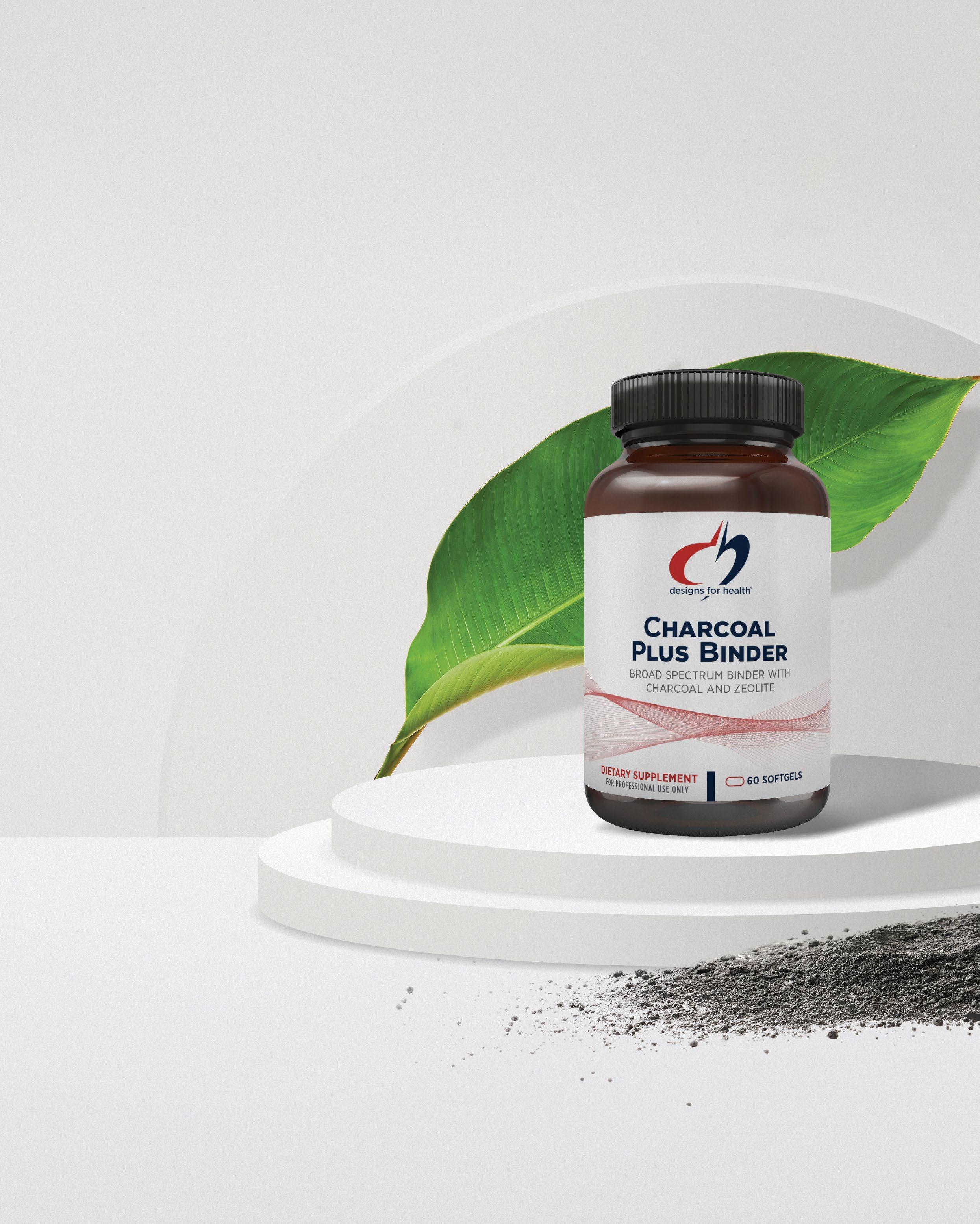

*These statements have not been evaluated by the Food and Drug Administration. This product is not intended to diagnose, treat, cure, or prevent any disease. Designs for Health and logo are trademarks of Designs for Health, Inc. © 2023 Designs for Health, Inc. All rights reserved. Delivers a high concentration of GI binders in just 2 softgels daily
A powerful softgel that gently binds and eliminates naturally occurring toxins in the gastrointestinal (GI) tract.* Scan now and order today! *These statements have not been evaluated by the Food and Drug Administration. This product is not intended to diagnose, treat, cure, or prevent any disease. Designs for Health and logo are trademarks of Designs for Health, Inc. © 2023 Designs for Health, Inc. All rights reserved.
High Binding. Healthy Elimination.*
PRACTICE IMPLICATIONS & LIMITATIONS
This study did not clarify whether pregnant women are more likely to experience post-Covid fatigue, primarily because there are no clear data on how common it is in the general public.1
However, it raised interesting subtleties about what may lead to post-Covid syndrome. First, it showed that the women who tested positive for Covid-19 during childbirth but had no symptoms did not have fatigue. Further, it correlated greater severity of Covid symptoms with more fatigue. It also brought to light a few important questions around how we can support our pregnant patients relative to Covid risk.
There is wide variability in the data around post-Covid fatigue in the general public:2 This study cites a range anywhere from 15% to 87%. This makes it difficult to evaluate whether this pregnant population had higher or lower rates of post-Covid fatigue than other groups. One meta-analysis of 68 studies found a 32% rate of post-Covid fatigue 12 weeks after diagnosis, which is similar to the rate found in the G1 cohort of this study.3 This suggests a similar rate of post-Covid fatigue in pregnancy relative to that of the general population.
Fatigue, however, is subjective and difficult to define. Also, it can be hard to distinguish whether fatigue in postpartum women is due to post-Covid syndrome. During the postpartum period, women are recovering from labor, coping with lack of sleep, feeding, and tending to the needs of an infant. It may be difficult to tease out what is post-Covid fatigue and what is simply due to the nature of being the mother of a newborn.4,5
Additionally, many other common postpartum disorders can cause fatigue, including anemia, other infections, thyroid disorder, mood disorders, and cardiomyopathy. Another thing to keep in mind is what the study missed due to a low visit-completion rate. In G1, 67.6% of the initial group followed up at 6 weeks, 48.2% at 3 months, and 30.5% at 6 months. The authors report that this cohort was generally of low socioeconomic status and may have had difficulty using public transport during the pandemic to travel to follow-up
appointments, so we do not know what symptoms went unreported.
While this study does not definitively show that pregnant women are more susceptible to post-Covid fatigue, it does correlate the severity of Covid-19 disease with fatigue. This is important because, while it is inconclusive whether pregnancy increases susceptibility to Covid, pregnancy is correlated with higher rates of severe Covid infection and increased occurrence of negative maternal-fetal outcomes.6-9 With this in mind, it is important to consider which pregnant patients might be more likely to contract a severe case of Covid. While hypertension and lung disease were not correlated with post-Covid fatigue in this study, a higher percentage of the women in this study who had these comorbidities were in G1. Also, while none of the subjects in G1 with fatigue were diabetic, other studies have found higher rates of post-Covid fatigue in type 2 diabetics.10
Another interesting point brought up by this study is that a positive SARS-CoV-2 serology in the absence of symptoms is not associated with post-Covid symptoms. In this study, the more severe the Covid symptoms, the more severe the fatigue. Other studies have found that it is not the level of SARS-CoV-2 virus but rather the amount of inflammatory proteins present that correlates with severity of disease and post-Covid symptoms such as fatigue.11
When we have pregnant patients in the office asking about Covid, it is worth considering both the increased potential for negative outcomes and any other health concerns they may have. We can reassure them that if they have a mild case of Covid, there is no correlation with fatigue. So patients do not
10 ©2023 NATURAL MEDICINE JOURNAL. ALL RIGHTS RESERVED. NMJ, MAY 2023 SUPPLEMENT—VOL. 16, NO. 51 (SUPPL)
“ ” ABSTRACT & COMMENTARY
It is important to consider which pregnant patients might be more likely to contract a severe case of Covid.
need to worry if they have tested positive for Covid but have not had symptoms or had symptoms mild enough to avoid hospitalization.
With that said, anything we can do as clinicians for our pregnant patients to decrease the likelihood of contracting Covid or the severity of their symptoms is highly beneficial. This includes offering vaccination as an option, as this decreases the occurrence of these negative outcomes.12
REFERENCES
1 Jamieson DJ, Rasmussen SA. An update on Covid-19 and pregnancy. Am J Obstet Gynecol. 2022;226(2):177-186.
2 Nalbandian A, Sehgal K, Gupta A, et al. Post-acute Covid-19 syndrome. Nat Med. 2021;27(4):601-615.
3 Ceban F, Ling S, Lui LMW, et al. Fatigue and cognitive impairment in postCovid-19 syndrome: a systematic review and meta-analysis. Brain Behav Immun. 2022;101:93-135.
4 Wilson N, Lee JJ, Bei B. Postpartum fatigue and depression: a systematic review and meta-analysis. J Affect Disord. 2019;246:224-233.
5 Atkinson LS, Baxley EG. Postpartum fatigue. Am Fam Physician. 1994;50(1):113-118.
6 Facciolà A, Micali C, Visalli G, et al. Covid-19 and pregnancy: clinical outcomes and scientific evidence about vaccination. Eur Rev Med Pharmacol Sci. 2022;26(7):26102626.
7 Piekos SN, Price ND, Hood L, Hadlock JJ. The impact of maternal SARS-CoV-2 infection and Covid-19 vaccination on maternal-fetal outcomes. Reprod Toxicol. 2022;114:33-43.
8 Kumar R, Yeni CM, Utami NA, et al. SARS-CoV-2 infection during pregnancy and pregnancy-related conditions: concerns, challenges, management and mitigation strategies-a narrative review. J Infect Public Health. 2021;14(7):863-875.

9 Male V. SARS-CoV-2 infection and Covid-19 vaccination in pregnancy. Nat Rev Immunol. 2022;22(5):277-282.
10 Mittal J, Ghosh A, Bhatt SP, Anoop S, Ansari IA, Misra A. High prevalence of post Covid-19 fatigue in patients with type 2 diabetes: a case-control study. Diabetes Metab Syndr. 2021;15(6):102302.
11 Lechner-Scott J, Levy M, Hawkes C, Yeh A, Giovannoni G. Long Covid or post Covid-19 syndrome. Mult Scler Relat Disord. 2021;55:103268.
12 Wainstock T, Yoles I, Sergienko R, Sheiner E. Prenatal maternal Covid-19 vaccination and pregnancy outcomes. Vaccine. 2021;39(41):6037-6040.
©2023 NATURAL MEDICINE JOURNAL. ALL RIGHTS RESERVED. NMJ, MAY 2023 SUPPLEMENT—VOL. 16, NO. 51 (SUPPL) 11
Produced by Go Gold for exclusive benefits! Subscribe to the newsletter, and become a Gold Member for only $99 to access even more exclusive content, including unlimited access to all educational resources.! JOIN NOW integrativepractitioner.com/join Integrative Practitioner Community IntegrativePractitioner.com is the only interdisciplinary community for integrative practitioners; Become a member of the Integrative Practitioner community to stay up to date on the latest industry news, podcasts, and more educational resources. Looking for even more educational content? Subscribe to the Natural Medicine Journal newsletter to get the latest articles, studies, podcasts and more delivered straight to your inbox. SUBSCRIBE NOW naturalmedicinejournal.com/subscribe PORTFOLIO OF INTEGRATIVE HEALTHCARE MEDIA + EVENTS
Quercetin in Early Covid
Results of a randomized clinical trial
REFERENCE
Di Pierro F, Kham A, Iqtadar S, et al. Quercetin as a possible complementary agent for early-stage Covid-19: concluding results of a randomized clinical trial. Front Pharmacol. 2023;13:1096853.
STUDY OBJECTIVE
To assess possible therapeutic effects of quercetin in outpatients with early-stage, mild-to-moderate symptoms of Covid-19
KEY TAKEAWAY
In this study, patients taking quercetin during early-stage Covid cleared the virus and experienced symptom resolution significantly earlier than those in a control group.
DESIGN
Open-label, randomized, controlled clinical trial
PARTICIPANTS
There were 108 participants who started the trial and were randomly assigned in a 1:1 ratio to a treatment or control group. There were 4 participants per group who dropped out, leaving a total of 50 participants per group (50% female in the control group; 54% female in the quercetin group). A significant difference between the groups was that the treatment group had a mean age of 41.1 years and the control group had a mean age of 54.1 years.
Inclusion criteria included being 18 years or older, positive RT-PCR (reverse transcription–polymerase chain reaction) test results, and mild-moderate Covid-19 symptoms defined as: fever, dyspnea, dry cough, sore throat, myalgia, and/or weakness. In addition, participants had to have an O2 stat over 93% and be appropriate candidates for outpatient care.
Exclusion criteria included allergy to quercetin, chronic kidney disease, pregnancy, severe hypotension, moderate-to-severe thrombocytopenia, and being on an immune stimulant prior to time of enrollment.
Comorbidities and symptom profile between groups were well-matched. This trial took place in Lahore, Pakistan. The paper made no mention of racial identity. Notably, none of the participants were vaccinated.
INTERVENTION
By Caitlin O’Connor, ND
Participants received 500 mg quercetin phytosome 3 times daily for 1 week and 2 times daily for week 2 as an add-on to standardized care. The control group received only standardized care; no placebo was used.
STUDY PARAMETERS ASSESSED
This study measured SARS-CoV-2 infection by RT-PCR testing and symptom prevalence and severity as clinically assessed by outpatient physicians. Additionally, investigators assessed laboratory levels of C-reactive protein (CRP), D-Dimer, lactate dehydrogenase (LDH), ferritin, and complete blood count (CBC).
PRIMARY OUTCOME
The primary outcomes assessed in this study were the time needed to achieve a negative SARS-CoV-2 RT-PCR test and improvement in acute symptoms at the 1- and 2-week mark as assessed by an outpatient physician. Secondary outcomes included laboratory changes over the same period.
KEY FINDINGS
The quercetin treatment group had significantly more participants test negative for the SARS-CoV-2 virus at 1 week compared to the control group (68% vs 24%, P=0.0004). Interestingly, by week 2 nearly all participants, regardless of group, had cleared the virus (98% in treatment group and 94% in control).
Clinical resolution of acute symptoms also occurred more quickly in the treatment group (52%) vs the control (24%; P=0.0031). Again, both groups seemed to fare equally well at the 2-week mark, with “most of patients” being free of symptoms—although the article did not show this specific dataset.
TRANSPARENCY
The quercetin phytosome used in this trial was donated by 2 companies (PharmExtracta and Indena) that distribute the quercetin phytosome; 4 of the 13 authors are on the boards of said companies.
12 ©2023 NATURAL MEDICINE JOURNAL. ALL RIGHTS RESERVED. NMJ, MAY 2023 SUPPLEMENT—VOL. 16, NO. 51 (SUPPL)
ABSTRACT & COMMENTARY
PRACTICE IMPLICATIONS & LIMITATIONS
As we are learning to coexist with SARS-CoV-2, any information on how to mitigate the impact and improve patient outcomes is welcome. The most compelling component of this study from a clinical standpoint was the accessibility of the intervention: The quercetin phytosome was dosed at 500 mg 3 times a day for the first week and 500 mg 2 times a day for the subsequent week. Additionally, participants tolerated the intervention well, with no adverse effects reported.
However, the study has some significant limitations. The first is the significant age difference between the treatment group (mean age 41.1 years) and the control group (mean age 54.1 years). With age being one of the main risk factors for acute complications from SARS-CoV-2 infection, it is hard to know if we can attribute the benefits seen in the treatment group to quercetin or just younger age. The small sample size is also a drawback—although one that is common in the evaluation of complementary treatments. Additionally, we can only hypothesize how these findings may translate into a vaccinated population.
Despite these limitations, the outcomes at 1 week are impressive; certainly many of our patients would love to clear the virus more quickly and, thus, decrease the timeframe in which they could possibly infect others. Moreover, many patients would be quite thrilled with any intervention that reduces their acute symptomatic phase. With these 2 things in mind, I think many clinicians might be willing to offer this safe, relatively inexpensive, and possibly beneficial intervention.
Another compelling finding was the similarity between the 2 groups after 2 weeks. At this point, nearly all patients had cleared the virus and were asymptomatic. Put another way, while the phytosomal quercetin seemed to speed recovery, both groups eventually recovered by the end of 2 weeks. This rapid recovery may have been in part due to the mean age of both groups, their outpatient status, and (possibly) their lack of comorbidities (though the article did not clearly define these).
Fortunately, most people who contract Covid will recover. The odds greatly increase with lower age and lack of complicating
health factors. The statistics vary around what percentage of these patients go on to develop symptoms of long Covid, and certainly we could use more clarity about the definition and prevalence of this syndrome. It would be interesting to note if the quercetin intervention affected the development of long Covid symptoms, though the small sample size would likely preclude any statistically significant data.
Nevertheless, phytosomal quercetin may be an accessible and safe option to offer patients looking to shorten their symptomatic Covid, even though clearance is the most likely natural course of the infection.
LISTEN TO NATURAL MEDICINE JOURNAL ON THE GO.
©2023 NATURAL MEDICINE JOURNAL. ALL RIGHTS RESERVED. NMJ, MAY 2023 SUPPLEMENT—VOL. 16, NO. 51 (SUPPL) 13
“ ”
The most compelling component of this study from a clinical standpoint was the accessibility of the intervention…
SUBSCRIBE TO OUR PODCAST PODCAST SERIES
Long Covid Prevention and Recovery
A discussion with 3 veteran integrative medical practitioners
Nearly 1 in 5 adults who have had Covid currently experience symptoms of “long Covid,” according to the US government’s Household Pulse Survey.1 Long Covid is defined as symptoms lasting 3 months or more after first contracting SARS-CoV-2. Natural Medicine Journal Editor-in-Chief Tina Kaczor, ND, FABNO, recently discussed prevention of long Covid with 3 colleagues, each of whom has been practicing as a clinician for at least 25 years.
Kaczor posed 4 important questions to these experts:
1. What do you think the cause of long Covid is, and how is it related to other chronic fatigue syndromes?
2. What do you do across the board for your patients for acute Covid and long Covid?
3. Are there any certain labs that you use?
4. And do you consider long Covid curable, or is it something people have to manage for the rest of their lives?
The experts who weighed in are:
· Edythe Vickers, ND, LAc, a naturopathic physician and licensed acupuncturist with expertise in seamlessly combining Chinese medicine and naturopathic medicine to create personalized treatments for each patient. Vickers is the clinical director of An Hao Natural Health Care Clinic, a division of the Institute for Traditional Medicine (ITM), a nonprofit organization dedicated to keeping traditional medicine relevant in the modern setting. She practices in Portland, Oregon.
· Virender Sodhi, MD (Ayurveda), ND, has been practicing since 1988. He is founder and current CEO of Ayush Herbs, offering high-quality Ayurvedic herbal products and supplements worldwide. He practices at his clinic in Bellevue, Washington, which is fittingly called the Ayurvedic and Naturopathic Medical Clinic.
· Jacob Teitelbaum, MD, is a medical doctor who is board certified in internal medicine and is known for his work in chronic fatigue syndrome, fibromyalgia, sleep, and pain. He has authored numerous books, including the best-selling From Fatigued to Fantastic, which is now in its fourth edition. He has also developed the popular free smartphone app CuresA-Z. Teitelbaum currently resides in Kona, Hawaii.
What follows is a condensed and edited version of the discussion. The full episode, which includes specific approaches,
supplements, and treatments, is available on the Natural Medicine Journal Podcast.
Kaczor: Let’s begin with Dr Teitelbaum. Dr Teitelbaum, what do you think is the cause of long Covid, and how is it related to other chronic fatigue syndromes?
Teitelbaum: Long Covid is simply one more form of postviral chronic fatigue syndrome (CFS) and fibromyalgia. Fibromyalgia and CFS reflect an energy crisis, where the hypothalamus in the brain, which controls various functions, malfunctions due to a drop in energy production in the body. This can be triggered by various infections, as many viruses trigger the lowering of energy production and this can lead to malfunctioning of the hypothalamus, which uses an inordinate amount of energy itself. The body’s energy production slows down to starve out infections, but sometimes it gets stuck in this process, resulting in insufficient energy production in muscles and other long-lasting symptoms. Our research shows that it is possible to restore the proper functioning of the hypothalamus, with 91% of people recovering and experiencing a 90% increase in their quality of life.
Kaczor: Thank you, Dr Teitelbaum. Dr Sodhi, what are your thoughts on the matter?
Sodhi: I believe there are similarities between long Covid and other chronic fatigue syndromes. From an Ayurvedic perspective, imbalances in the body can lead to a toxic load. These imbalances can arise from various factors, including mental and emotional aspects. When the body is overwhelmed by toxins, it becomes more susceptible to infections. The imbalances affect different systems in the body, leading to a range of
14 ©2023 NATURAL MEDICINE JOURNAL. ALL RIGHTS RESERVED. NMJ, MAY 2023 SUPPLEMENT—VOL. 16, NO. 51 (SUPPL) EXPERT INTERVIEW
Listen to the full podcast here. Approximate listening time: 45 minutes
symptoms, and precisely which symptoms arise depends on the person’s constitution. Restoring balance through addressing mental, emotional, physical, and nutritional factors is crucial to bringing the person back into a state of balance.
Kaczor: That’s intriguing, Dr Sodhi. Dr Vickers, could you share your perspective?
Vickers: From a naturopathic medicine viewpoint, long Covid can result from immune dysfunction or residual inflammation. In Chinese medicine, it is seen as a wind invasion that transforms into internal heat and pathogenic responses. These toxins accumulate between the heart and diaphragm, causing deficiencies in different organs based on the individual’s weaknesses. The symptoms manifest depending on the affected areas, such as the lungs, digestive system, or musculoskeletal system. Long Covid shares similarities with other chronic conditions like chronic fatigue syndrome, chronic Lyme, and chronic viral infections. The underlying constitution of the patient, external forces, and nutrient deficiencies all play a significant role in understanding and addressing these conditions.
Kaczor: So, Dr Vickers, would it be fair to say that external forces, including pathogens, emotions, and stressors, can affect individuals based on their vulnerabilities?
Vickers: Indeed, external forces such as pathogens, emotions, and stressors can impact individuals differently based on their vulnerabilities and constitutions. A subset of individuals may be more susceptible to long Covid based on their constitutional weaknesses. For example, individuals with more of a “Metal” constitution may experience symptoms related to the respiratory system, such as asthma in childhood or develop pneumonia more easily. It is also possible that the large intestine manifests symptoms, in which case symptoms like chronic diarrhea or colitis can appear. The vulnerability of an individual to long Covid depends on their unique constitutional makeup and how it interacts with the effects of the virus. It’s important to consider these individual factors when managing and treating long Covid.
Kaczor: As Dr Vickers mentioned, the constitution of the patient from a Chinese medicine perspective can dictate not only the pathology direction but also the vulnerability of the
patient. Dr Sodhi, could you explain this further from an Ayurvedic perspective?
Sodhi: Certainly. In Ayurveda, we recognize different constitutional types (or doshas) known as Vata, Pitta, and Kapha. Each type has its own characteristics and tendencies. For example, individuals with a Vata type are always moving and can experience anxiety and fear easily. Pitta individuals are energetic and driven, they are go-getters but may also struggle with anger and frustration. Kapha individuals tend to be slower and can lack movement or motivation, they can be stuck in their ideas, and they are more prone to laziness and weight gain. When there is imbalance in the doshas, health problems can occur. By understanding one’s constitution and making lifestyle and dietary adjustments accordingly, we can promote balance and prevent issues from arising.
Kaczor: Thank you, Dr Sodhi. It seems that both Chinese medicine and Ayurveda emphasize the importance of considering individual constitution and imbalances when addressing health conditions. This holistic approach provides valuable insights into managing long Covid and other chronic conditions.
Kaczor: What do you do across the board for your patients for acute Covid and to prevent long Covid?
Sodhi: For both acute and long Covid, I recommend simple and free remedies. Rest is crucial, along with maintaining a healthy diet and staying hydrated. Breathing exercises and cleansing programs can also support the body’s natural healing processes.
Vickers: In Chinese medicine, we treat the specific symptoms caused by Covid. For acute cases, we focus on clearing toxic heat, and once that’s resolved, we introduce tonic herbs to prevent long Covid. I use a combination of acupuncture, herbs, nutraceuticals, and specific antiviral formulas.
Teitelbaum: Rest is vital during acute Covid. To prevent long Covid, I recommend taking a multivitamin high in zinc, and a mix of elderberries. Metformin can be beneficial in the early stages to improve energy production and overcome insulin resistance.
©2023 NATURAL MEDICINE JOURNAL. ALL RIGHTS RESERVED. NMJ, MAY 2023 SUPPLEMENT—VOL. 16, NO. 51 (SUPPL) 15
Kaczor: Is resuming normal life too quickly a risk factor for developing long Covid?
Vickers: Yes, it is. People should avoid rushing back into their daily routines too soon after feeling better. Adequate rest and avoiding excessive physical exertion for at least 2 weeks after the symptoms have resolved comepletley can help prevent the evolution into long Covid.
Sodhi: I absolutely agree. People who lead highly active or stressful lives are more prone to developing long Covid. It’s essential to prioritize rest and make necessary lifestyle changes.
Kaczor: Dr Teitelbaum, how do you approach chronic fatigue in patients who previously had Covid?
Teitelbaum: I recommend the SHINE protocol, which focuses on restoring energy production. This involves optimizing Sleep, addressing Hormonal deficiencies, treating Infections, and providing Nutritional support. Exercise should also be incorporated to prevent deconditioning.
Kaczor: What treatments do you suggest for long Covid?
Teitelbaum: For the fatigue, body aches, and brain fog associated with long Covid, I recommend the SHINE protocol. Additionally, curcumin supplements can help reduce inflammation, and specific formulas like Cura Pro can target organ damage. Nutritional support, including B vitamins, magnesium, and ribose, along with exercise, are crucial for recovery.
Vickers: I utilize various treatments such as antiviral herbs, like Istatis and others, low-dose naltrexone for brain fog and inflammation, and acupuncture to address long Covid symptoms. Specific herbs like Boswellia can help with lung inflammation. There are many more herbal combinations that are individualized based on the patient’s symptoms and constitution.
Sodhi: I focus on lifestyle changes, including a healthy diet, breathing exercises, and cleansing programs. Supplements like vitamin C, magnesium chloride, and herbal formulations such as curcumin can also be beneficial.
Kaczor: How do you address specific organ damage caused by Covid?
Teitelbaum: For heart and lung damage, I recommend using supplements like coenzyme Q10, magnesium, and a recipe of specific nutrients for heart failure. Curcumin and glutathione supplements can help reduce inflammation and oxidative stress.
Vickers: I use organ-specific treatments such as hawthorne for lung inflammation and formulas like Isatis 6 for antiviral support. Acupuncture can also be beneficial for heart and lung conditions.
Sodhi: Specific organ damage requires targeted approaches. For lung inflammation, boswellia can be effective, and for heart conditions, I recommend supplements like magnesium and coenzyme Q10. Always, the balancing of the doshas is part of the treatment.
Kaczor: What advice do you have for patients recovering from Covid to prevent relapse?
Teitelbaum: It’s essential for patients to prioritize activities that bring them joy and avoid falling back into the habits that may have contributed to their initial illness. They should focus on optimizing energy levels, addressing any underlying conditions, and avoiding overexertion. Following a balanced and healthy lifestyle is key to preventing relapse.
Vickers: I echo Dr Teitelbaum’s advice. Patients should use their recovery as an opportunity to reassess their priorities and engage in activities that nourish their spirits. It’s crucial to avoid returning to a lifestyle that contributed to their illness in the first place.
Sodhi: I completely agree. Patients need to recognize the importance of self-care and make conscious choices to maintain a balanced and healthy lifestyle. Prioritizing rest, nourishing their bodies with healthy food, and managing stress are essential for preventing relapse.
Kaczor: Are there any certain labs that you use?
Teitelbaum: To diagnose long Covid, CFS, and fibromyalgia, bloodwork is not necessary. Normal ranges in blood tests don’t indicate if a person is fine or not. I rely on symptoms to
16 ©2023 NATURAL MEDICINE JOURNAL. ALL RIGHTS RESERVED. NMJ, MAY 2023 SUPPLEMENT—VOL. 16, NO. 51 (SUPPL) EXPERT INTERVIEW
guide the diagnosis and the treatment, and there are various tests that can help identify ongoing issues so they can be addressed.
Sodhi: I use basic labs like CBC and ESR, along with tests for inflammatory markers, liver enzymes, kidney function, and thyroid. Depending on the individual, I might run additional tests like ferritin, stool testing, or vitamin D levels. There are many more tests that we naturopathic physicians will run based on the patient’s signs and symptoms.
Vickers: I always run CRP to measure inflammatory markers. I also look at white and red blood cell counts and sometimes perform stool and parasite testing. Vitamin D levels and cortisol testing are important too, especially for sleep and stress-related issues.
Kaczor: Do you consider long Covid curable, or is it something people have to manage for the rest of their lives?
Vickers: It’s hard to answer definitively. There seem to be different types of long Covid. In some cases, with proper treatment, it can resolve completely. However, for others, it may persist and fluctuate over time, ebbing and relapsing, similar to chronic conditions like chronic fatigue or Lyme disease.
Sodhi: If we can stop the inflammation cycle triggered by the cytokine storm, we can have a significant impact on long Covid. Natural remedies like turmeric and ashwagandha can help reduce inflammation. Lifestyle factors, such as breathing exercises and stress management, play a crucial role in recovery.

Teitelbaum: Rather than considering it a disease, we should focus on living a balanced and authentic life. By following our true desires and prioritizing self-care, we can prevent relapses and allow the body to heal.
Sodhi: Supplements alone are not the solution. Healing requires a holistic approach that addresses the body, mind, and spirit. Consciousness and awareness of our actions and motivations are essential for complete healing.
Kaczor: Any final thoughts or recommendations for patients dealing with acute or long Covid?
Teitelbaum: Remember to be patient with your recovery process. The treatments and lifestyle changes discussed here are highly effective and can greatly improve your quality of life. Don’t hesitate to seek professional guidance and support.
Vickers: Each person’s journey with Covid is unique, so it’s crucial to individualize treatments based on their specific symptoms and needs. Consulting with practitioners who specialize in developing a comprehensive and tailored approach to recovery is ideal.
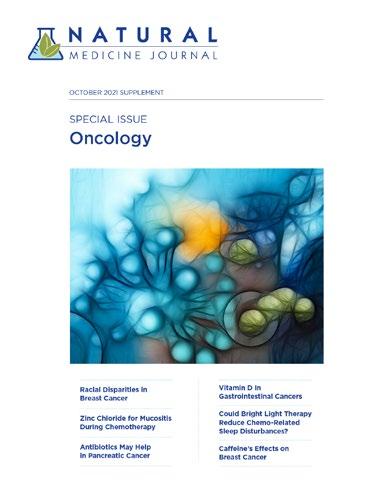
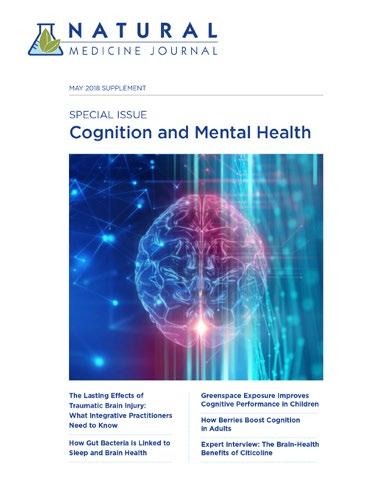
Sodhi: Embrace the power of natural remedies and the wisdom of your body. Simple lifestyle changes, such as rest, healthy eating, and breathing exercises, can have a profound impact on your well-being. Trust in the body’s innate healing abilities.
REFERENCE
1 CDC. Long Covid–Household Pulse Survey–Covid-19. www.cdc.gov. Published July 19, 2022. https://www.cdc.gov/nchs/covid19/pulse/long-covid.htm http://eepurl.com/d6zXb
©2023 NATURAL MEDICINE JOURNAL. ALL RIGHTS RESERVED. NMJ, MAY 2023 SUPPLEMENT—VOL. 16, NO. 51 (SUPPL) 17
DON’T MISS OUT Click here to sign up for free and be sure you receive every issue of the Natural Medicine Journal.
























